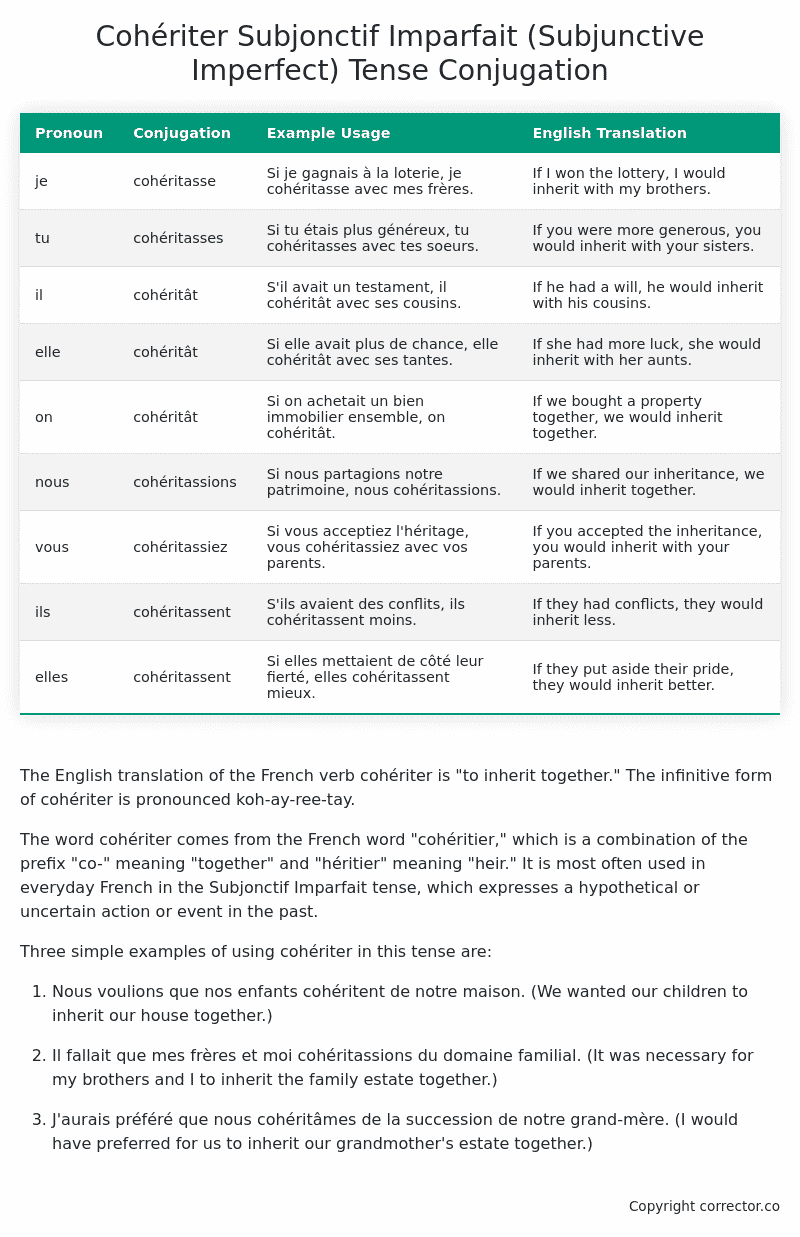Subjonctif Imparfait (Subjunctive Imperfect) Tense Conjugation of the French Verb cohériter
Introduction to the verb cohériter
The English translation of the French verb cohériter is “to inherit together.” The infinitive form of cohériter is pronounced koh-ay-ree-tay.
The word cohériter comes from the French word “cohéritier,” which is a combination of the prefix “co-” meaning “together” and “héritier” meaning “heir.” It is most often used in everyday French in the Subjonctif Imparfait tense, which expresses a hypothetical or uncertain action or event in the past.
Three simple examples of using cohériter in this tense are:
-
Nous voulions que nos enfants cohéritent de notre maison. (We wanted our children to inherit our house together.)
-
Il fallait que mes frères et moi cohéritassions du domaine familial. (It was necessary for my brothers and I to inherit the family estate together.)
-
J’aurais préféré que nous cohéritâmes de la succession de notre grand-mère. (I would have preferred for us to inherit our grandmother’s estate together.)
Table of the Subjonctif Imparfait (Subjunctive Imperfect) Tense Conjugation of cohériter
| Pronoun | Conjugation | Example Usage | English Translation |
|---|---|---|---|
| je | cohéritasse | Si je gagnais à la loterie, je cohéritasse avec mes frères. | If I won the lottery, I would inherit with my brothers. |
| tu | cohéritasses | Si tu étais plus généreux, tu cohéritasses avec tes soeurs. | If you were more generous, you would inherit with your sisters. |
| il | cohéritât | S’il avait un testament, il cohéritât avec ses cousins. | If he had a will, he would inherit with his cousins. |
| elle | cohéritât | Si elle avait plus de chance, elle cohéritât avec ses tantes. | If she had more luck, she would inherit with her aunts. |
| on | cohéritât | Si on achetait un bien immobilier ensemble, on cohéritât. | If we bought a property together, we would inherit together. |
| nous | cohéritassions | Si nous partagions notre patrimoine, nous cohéritassions. | If we shared our inheritance, we would inherit together. |
| vous | cohéritassiez | Si vous acceptiez l’héritage, vous cohéritassiez avec vos parents. | If you accepted the inheritance, you would inherit with your parents. |
| ils | cohéritassent | S’ils avaient des conflits, ils cohéritassent moins. | If they had conflicts, they would inherit less. |
| elles | cohéritassent | Si elles mettaient de côté leur fierté, elles cohéritassent mieux. | If they put aside their pride, they would inherit better. |
Other Conjugations for Cohériter.
Le Present (Present Tense) Conjugation of the French Verb cohériter
Imparfait (Imperfect) Tense Conjugation of the French Verb cohériter
Passé Simple (Simple Past) Tense Conjugation of the French Verb cohériter
Passé Composé (Present Perfect) Tense Conjugation of the French Verb cohériter
Futur Simple (Simple Future) Tense Conjugation of the French Verb cohériter
Futur Proche (Near Future) Tense Conjugation of the French Verb cohériter
Plus-que-parfait (Pluperfect) Tense Conjugation of the French Verb cohériter
Passé Antérieur (Past Anterior) Tense Conjugation of the French Verb cohériter
Futur Antérieur (Future Anterior) Tense Conjugation of the French Verb cohériter
Subjonctif Présent (Subjunctive Present) Tense Conjugation of the French Verb cohériter
Subjonctif Passé (Subjunctive Past) Tense Conjugation of the French Verb cohériter
Subjonctif Imparfait (Subjunctive Imperfect) Tense Conjugation of the French Verb cohériter (this article)
Subjonctif Plus-que-parfait (Subjunctive Pluperfect) Tense Conjugation of the French Verb cohériter
Conditionnel Présent (Conditional Present) Tense Conjugation of the French Verb cohériter
Conditionnel Passé (Conditional Past) Tense Conjugation of the French Verb cohériter
L’impératif Présent (Imperative Present) Tense Conjugation of the French Verb cohériter
L’infinitif Présent (Infinitive Present) Tense Conjugation of the French Verb cohériter
Struggling with French verbs or the language in general? Why not use our free French Grammar Checker – no registration required!
Get a FREE Download Study Sheet of this Conjugation 🔥
Simply right click the image below, click “save image” and get your free reference for the cohériter Subjonctif Imparfait tense conjugation!

Cohériter – About the French Subjonctif Imparfait (Subjunctive Imperfect) Tense
Formation
Common Everyday Usage Patterns
Interactions with Other Tenses
Subjonctif Présent
Indicatif Passé Composé
Conditional
Conditional Perfect
Summary
I hope you enjoyed this article on the verb cohériter. Still in a learning mood? Check out another TOTALLY random French verb conjugation!


